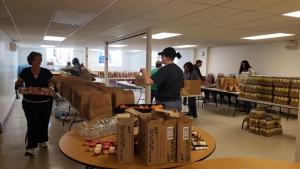
By Illinois Radio Network
SPRINGFIELD – The COVID-19 crisis has hit rural and small Illinois school districts hard.
While larger districts are designing and running online classes for remote learning, many of the 400 school districts that Dave Ardrey works with are scrambling to get meals to their students. Without school meals, many students in rural and small districts risk going hungry.
“Our rural superintendents wake up every morning and the first thing they are thinking about, honestly, is ‘How do we get food out to our families and our children?’ The second thought is ‘How do we support them educationally?’” said Ardrey, executive director of the Association of Illinois Rural and Small Schools. “Every day, we manage that day’s crisis. We’ve been working in two-week increments. No one knows how long the shutdown will last.”
Ardrey said he would like to have all the students in his districts logging on for e-learning. For most of them, however, remote learning is not an option.
“Sadly, this (crisis) is really going to expose some of the weaknesses and some of the inequities in our rural schools,” Ardrey said.
About 400,000 students in Illinois attend rural and small schools, he said. Many of them live in areas without strong, fixed broadband.
“It is really challenging,” Ardrey said.
Even where high-speed internet is available, not all families can afford it and not all families have computers at home.
School officials are working to make sure students continue learning while schools are closed.
“I really commend our superintendents,” Ardrey said. “They are working night and day. They are working both in the educational and in making sure that students have food.”
On the education front, some schools are printing lessons on paper and assembling educational packets for the students. Districts have been using school buses to deliver both the educational materials and meals to students on their normal bus routes.
Other districts have food available for families at pickup locations. Others are using multiple pickup locations.
Principals, superintendents, teachers and school board members are improvising.
“It’s day by day,” Ardrey said. “There is no one we can ask for advice because no one has been through this type of situation.”
The upside of being in a rural community is that the schools tend to be smaller. And often, the schools are the focus of their communities.
“Every day the phone rings and it is someone willing to help,” Ardrey said.
Illinois Radio Network can be reached at [email protected].






